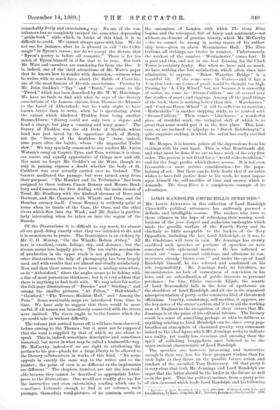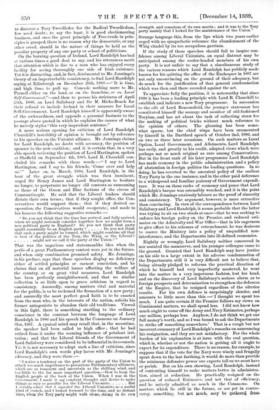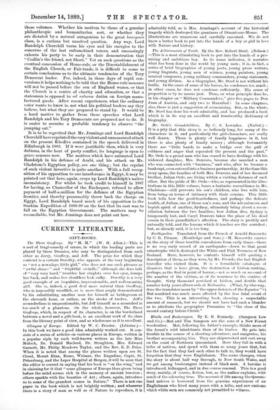LORD RANDOLPH CHURCHILL'S SPEECHES.* Mn. LOUIS JENNINGS in this collection
of Lord Randolph Churchill's political utterances has uniformly pursued a definite and intelligible course. The readers who turn to these volumes in the hope of refreshing their waning recol- lections of the jean d'esprit and audacious onslaughts which made the guerilla warfare of the Fourth Party and its chieftain as little acceptable to the leaders of the Tory Opposition, including the late Lord Iddesleigh, as it was to Mr. Gladstone, will turn in vain. Mr. Jennings has sternly sacrificed such speeches or portions of speeches as were concerned with ephemeral matters. He has softened or struck out " some personal criticisms and allusions to con- troversies already blown over, " and under the eye of Lord Randolph himself, he has selected and condensed on his sole responsibility. Mr. Jennings finds no frivolities, no inconsistencies, no lack of earnestness of conviction in his hero, and no subordination of public interests to personal petulance ; for him, Elisha succeeds Elijah, the mantle of Lord Beaconsfield falls in the hour of apotheosis on the shoulders of Lord Randolph, and all else is the organised misrepresentation of party, or the venomous libel of threatened officialism. Gravity, consistency, self-sacrifice, it appears, are the key-notes of the orator's action, and it is to aid the working men of England in the recognition of these virtues that Mr. Jennings is at the pains of his editorial labours. The literary result is a sense of something perhaps as akin to dullness as anything relating to Lord Randolph can be, since every page breathes an atmosphere of chastened gravity, very consonant indeed to the ideal figure which Mr. Jennings seeks to indicate as a reality, yet vastly less vivacious and amusing than the spirit of rollicking braggadocio once believed to be the super-eminent characteristic of Lord Randolph.
The speeches are, however, interesting and instructive enough in their way, less for their pregnant wisdom than for such light as they throw on the possible future, action, and conduct of the so-called Tory Democracy. Of that party it is very clear that both Mr. Jennings and Lord Randolph are eager that the latter should be the leader in the future as well as in the past. That the political instinct, from a party point of view, is sound which leads Lord Randolph and his following • Speeches of Lord Randolph Churchill, 18X0-18X8. Collected, with Notep and Introduction, by Louh Jennings, M.1'. London; LongmauF, Qrecn, and Co. 1895.
to discover a Tory Tweedledee for the Radical Tweedledum, few need doubt ; to say the least, it is good electioneering business, and once the great principle of Free-trade in prin- ciples is grasped, there is no reason why the democratic, or any other creed, should in the nature of things be held as the peculiar property of any one party or school of politicians.
On the burning question of Ireland, Lord Randolph has had at various times a good deal to say, and his utterances merit that attention which is due to a man who has enjoyed every facility for seeing thoroughly one side of Irish existence. Yet it is distracting, and, in fact, detrimental to Mr. Jennings's
theory of an imperturbable consistency, to find Lord Randolph saying at Edinburgh on December 20th, 1883:—" It is time, and high time, to pull up. Concede nothing more to Mr. Parnell either on the land, or on the franchise, or on Local Self-Government,"—and then to peruse his strictures of April :.,)5th, 1888, on Lord Salisbury and Sir M. Hicks-Beach for
their refusal to include Ireland in their measure for Local Self-Government. Lord Randolph himself is apparently aware of the awkwardness, and appends a personal footnote to the passage above quoted in which he explains the causes of what he naively styles "this very imprudent sentence."
A more serious opening for criticism of Lord Randolph Churchill's instability of opinion is brought out by reference to his speeches on the Unionist alliance. Mr. Jennings claims for Lord Randolph, no doubt with accuracy, the position of sponsor to the new coalition; and it is certain that, in a very able speech reviewing the position of Lord Hartington, spoken at Sheffield on September 4th, 1885, Lord R. Churchill con- cluded his remarks with these words :—" I say to Lord Hartington, and I say to his friends, Come over and help us." Later on, in March, 1886, Lord Randolph, in the beat of the great struggle which was then imminent, urged Sir Henry James and Lord Hartington to hesitate no longer, to perpetuate no longer old contests as unmeaning as those of the Green and Blue factions of the circus of Constantinople. He said that the Liberal leaders should dictate their own terms ; that if they sought office, the Con- servatives would support them ; that if they desired co- operation, the Conservatives would co-operate ; and made to his hearers the following suggestive remarks :-
" Do you not think that the time has arrived, and fully arrived, when we might seriously consider together how we might form a new political party in England ? Do you not think that party might essentially be an English party ? Do you not think that such a party might be formed, which might combine all that is best of the politics of the Tory, the Whig, or the Liberal ?
might not we call it the party of the Union ?"
That was the sagacious and statesmanlike idea when the perils of a great Parliamentary contest were yet in the future, and when only combination promised safety. Mr. Jennings, in his preface, says that these speeches display no deficiency either of settled principles or earnest conviction, and he claims that on all material issues affecting the welfare of the country, or on great vital measures, Lord Randolph has been perfectly straightforward, and that no similar collection is so little open to grave criticism in regard to consistency. Assuredly, among matters vital and material for the public, is to be reckoned the formation of a new party; and assuredly the most perfect good faith is to be exacted from the man who, in the interests of the nation, solicits his former antagonists to abandon their old traditions. Viewed in this light, there is something startling to the ordinary conscience in the contrast between the language of Lord Randolph in 1886 and his speech in the Commons on January 31st, 1887. A cynical mind may recall that, in the meantime, the speaker had been called to high office ; that he had retired from it under the seeming influence of petulant irri-
tation; and that the Liberal friends of the Government of Lord Salisbury were considered to be influential in its counsels.
Ye. it is not necessary to adopt such a line of criticism, since Lord Randolph's own words play havoc with Mr. Jennings's advocacy, and they were these :—
" I notice a tendency on the part of the party of the Union to attach too much importance to precarious Parliamentary alliances, which are as transient and uncertain as the shifting wind, and too little to the far more important question,—How to keep the English people at the back of the Union. When I was in the :overnment, I made it my constant thought and desire to make things as easy as passible for the Liberal Unionists But / frankly admit that I regarded the Liberal Unionists as a useful kind of crutch, and I looked forward to the time, and no distant time, when the Tory party might walk alone, strong in its own strength and conscious of its own merits ; and it was to the Tory party mainly that I looked for the maintenance of the Union."
Strange language this, from the lips which two years earlier urged with no sympathetic reticence the abandonment of the Whig citadel by its too scrupulous garrison.
If the study of these speeches should fail to inspire con- fidence among Liberal Unionists, an equal distrust may be anticipated among the cooler-headed members of his own party. It is not unfair to say that a simultaneous study of the various reasons which Lord Randolph has publicly made known for his quitting the office of the Exchequer in 1887 are not only unconvincing on the ground of their adequacy, but . do much for the justification of that general condemnation which was then and there recorded against the act.
To appreciate fully the position, it is noteworthy that since 1880 it has been a leading principle with Lord R. Churchill to establish and indicate a new Tory programme. In succession to the role of Lord Beaconsfield, the younger statesman has constituted himself the scourge and monitor of old-fashioned Toryism, and has set about the task of collecting straw for the making of political bricks without much reference to the opinion of others. The gleaning has been some- what sparse, but the chief wisps have been enumerated by himself in the Dartford speech of October 2nd, 1886, and on two or three later occasions. On such matters as Local Option, Local Government, and Allotments, Lord Randolph has early, and greatly to his credit, adopted views which were perhaps not so much original as rare among Conservatives. But in the front rank of his later programme Lord Randolph has made economy in the public administration and a policy of abstention in foreign politics the leading questions. In so doing, he has reverted to the ancestral policy of the earliest Tory Party in the one instance, and in the other paid deference to a widespread and familiar jealousy of Government expendi- ture. It was on these rocks of economy and peace that Lord Randolph's barque was ostensibly wrecked, and it is the point which Mr. Jennings anxiously labours as the proof of sincerity and consistency. The argument, however, is more attractive than convincing. In view of the correspondence between Lord Salisbury and Lord Randolph, it seems probable that the latter was trying to sit on two stools at once—that he was seeking to enforce his foreign policy on the Premier, and reduced esti- mates on the Admiralty and War Office—that in his eagerness to give effect to his schemes of retrenchment, he was desirous to coerce the Ministry into a policy of unqualified non- interference, and the Departments into ill-defined economies.
Rightly or wrongly, Lord Salisbury neither concurred in nor assisted the manoeuvre, and his younger colleague came to the ground. Granted that Lord Randolph may have justice on his side to a large extent in his adverse condemnation of the Departments, still it is very difficult not to believe that, being already pledged to reforms the practical direction of which he himself had very imperfectly mastered, he went into the matter in a very impetuous fashion, lost his head, and on the discovery of Lord Salisbury's serious alarm as to foreign prospects and determination to strengthen the defences of the Empire, that he resigned regardless of the ulterior results. For his own defence is surprisingly slender, and amounts to little more than this I thought we spent too much. I am quite certain if the Premier follows my views on Continental matters, we shall spend less. I did not know how much ought to come off the Army and Navy Estimates, perhaps one million, perhaps less. Anyhow, I do not think we get our full money's worth, and so I was bound to ask the Departments to strike off something somewhere.' That is a rough but not incorrect summary of Lord Randolph's remarks on announcing his resignation, and they are not satisfactory. For the whole burden of his explanation is at issue with the real question, which is, whether or not the nation is getting all it ought to expect for its expenditure. There is no reason, for example, to suppose that if the vote for the Navy were wisely and frugally spent down to the last farthing, it would do more than provide the minimum defensive power our experts tell us we must have or perish. But on his own showing, Lord Randolph, instead of contenting himself to make matters better in administra- tion, aimed at reduction. He practically resigned on the question of reduced Estimates, and not that of efficiency,
and he naively admitted as much in the Commons. On matters which lie still in the future, or are yet in contro- versy, something, but not much, may be gathered from these volumes. Whether his motives be those of a genuine philanthropic and humanitarian sort, or whether they are dictated by a natural antagonism to the great bourgeois class, is a curious but unsolved question. Any way, Lord Randolph Churchill turns his eyes and his energies to the concerns of the last enfranchised voters, and unceasingly exhorts his party to be early in their demonstration that " Godlin's the friend, not Short." Yet on such questions as the eventual concession of Home-rule, or the Disestablishment of the English Church, or Fair-trade, it is difficult to come to certain conclusions as to the ultimate tendencies of the Tory Democrat leader. For, indeed, in these days of rapid con- versions it helps nothing to be told that the Home-rule measure will not be passed before the sun of England wanes, or that the Church is a centre of charity and education, or that a statesman is opposed to ad valorem, duties on foreign manu- factured goods. After recent experiences, what the ordinary voter wants to know is, not what his political leaders say they believe, but what they are prepared to stand by. It would be a hard matter to gather from these speeches what Lord Randolph and his Tory Democrats are prepared not to do. It is easier to surmise a probable tendency to observe " the jumping cat."
It is to be regretted that Mr. Jennings and Lord Randolph Churchill have reprinted the very violent and unmeasured attack on the present Khedive contained in the speech delivered in Edinburgh in 1883. If it were justifiable then, which is very dubious, in the heat of party conflict, its language is open to grave censure now. The motives which have animated Lord Randolph in his defence of Arabi, and his attack on Mr. Gladstone's Egyptian policy, are one thing ; but the reprint of such violent invective is quite another. With a full recog- nition of his opposition to our interference in Egypt, it may be pointed out that here, again, crops up Lord. Randolph's native inconsistency. For whilst he took credit to himself in 1887 for having, as Chancellor of the Exchequer, refused to allow payment of half-a-million for the defence of the Egyptian frontier, and thereby presumably threw back the charge on Egypt, Lord Randolph based much of his opposition to the Suakim Expedition of 1888-89 on the fact that its cost was to fall on the Egyptian Government. The matters may be reconcilable, but Mr. Jennings does not point out how.












































 Previous page
Previous page